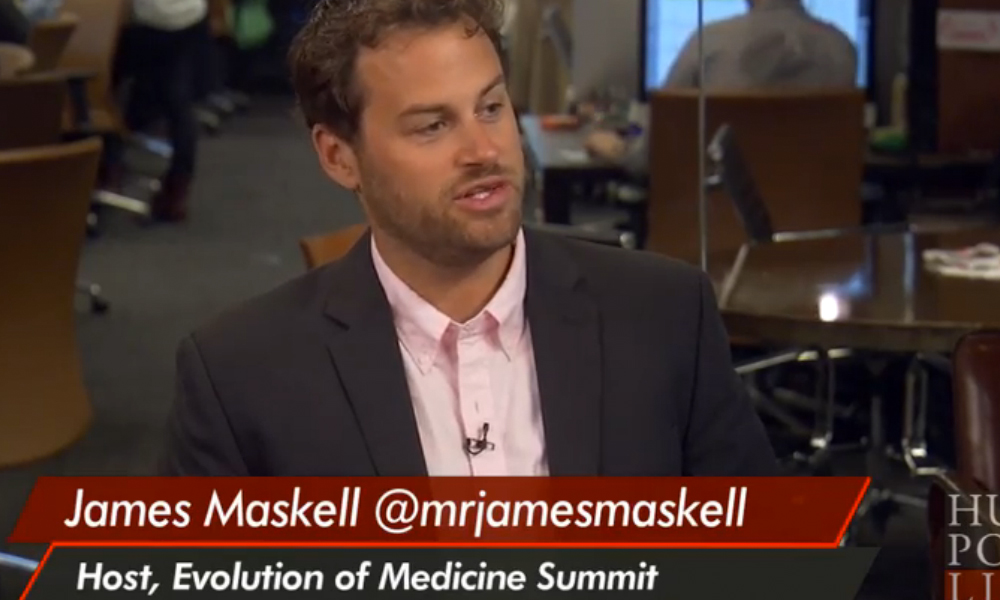 I recently attended one of the most energizing and inspiring events I’ve ever been to, the launch of the second annual Evolution of Medicine Summit.
I recently attended one of the most energizing and inspiring events I’ve ever been to, the launch of the second annual Evolution of Medicine Summit.
The kickoff took place on September 16, the same night that three Republican candidates for president upheld the right of parents to choose which vaccines to give their children and when. As far as TMR was concerned, the surprising events that occurred during the Republican debate, having been witnessed by 23 million people, took precedence over what was happening at the Evolution of Medicine Summit that night and the following week, but while the public statements made by candidates Donald Trump, Ben Carson, and Rand Paul make it clear that the general public is indeed waking up to how thoroughly the pharmaceutical industry controls what we hear and read in mainstream media with respect to vaccine safety or lack thereof, the events that took place at the Evolution of Medicine Summit may be even more important in the long-term scheme of things as they are generating the necessary paradigm shift in the healthcare industry that will support the shift that has already taken place in the minds of many healthcare consumers.
There are many problems inherent in our current U.S. healthcare system, among them are the facts that we have the most expensive healthcare in the world and we do not enjoy a comparable level of good health, the focus is on responding to acute illness instead of maintaining wellness, and as it is designed to care for those who have acute illnesses all it can offer those with chronic illness, an ever-increasing percentage of the population, is symptom management, usually with one or more pharmaceuticals that are taken “for life.”
Healthcare is a for-profit industry. As a result, there is little incentive within the industry to change the emphasis from pharmaceutical-based symptom management to one of maintenance of good health so that a lifetime of dependence on pharmaceuticals is not required to enjoy, much less live, one’s life. Many of us have become disillusioned with mainstream healthcare and are outgrowing the old paradigm, including the doctors themselves. Patients and doctors both are realizing that mainstream medicine doesn’t have anything to offer someone with a chronic health condition who wishes to get well.
Doctors are generally unsatisfied with their jobs and at high risk of burnout. Interns, doctors in training, are spending only an average of eight minutes with each patient, while primary care physicians generally schedule patients at 15-minute intervals. It’s getting harder and harder to see how the medical industry the way it’s currently structured can ever adapt enough to meet our real healthcare needs in a productive, efficient, and cost-effective manner.

Enter James Maskell, a British ex-pat with a vision. I first encountered James when I read his excellent articles “8 Reasons I Haven’t Vaccinated My Daughter,” and “8 More Reasons I Haven’t Vaccinated My Daughter.” (Check out number 4 on the history of polio. James succinctly summarizes some crucial – and, more importantly, true – information that relatively few people are aware of.) Fortunately for me, another blogger friend, who is a bit more extroverted than I am, reached out to him to draw him into a Facebook group we belong to. When he found out six months ago that I live in New York, James invited me to a monthly event he hosts called Functional Forum.
The Functional Forum is the world’s largest integrative medicine conference. On the first Monday of every month, this new concept in practitioner education, “medutainment”, brings together the latest health news, functional medicine research, practice development and health technology in an upbeat, entertaining way.
That particular night was about the human microbiome, a topic that has long been of interest to me and lately has been exploding within the research community. To say the evening was energizing is an understatement. If you hang around here, you’re probably already familiar with the huge role that the balance of gut bacteria plays in overall health and in such conditions such as allergies, asthma, autism, and ADHD in particular. You can imagine how interesting it was to see four functional medicine practitioners get up and tell us about where the science stands and how they are using their understanding of that science to help people with chronic illness heal.
It was tremendously exciting for me particularly to see doctors who were putting the latest research to use in healing their patients. I have known for nearly 30 years that cholesterol levels are not tied to dietary intake of saturated fat because a 1980s version of a functional medicine practitioner put me on a low-carbohydrate diet to lower my cholesterol because then-current research indicated that high cholesterol was associated with high insulin levels. The result? My cholesterol dropped from 280 to 140 in a month all while eating beef, butter, cheese, and egg yolks. Mainstream medicine, on the other hand, is very slow to react to new medical science. It was only last year that mainstream media and the bulk of medical practitioners finally acknowledged that there is no scientific justification for a low-cholesterol diet. In the last 30 years, mainstream medical practitioners have done tremendous damage to countless individuals by prescribing low-fat, low-cholesterol diets to lower cholesterol – and statins when those diets inevitably failed.
Clearly, given the recent huge rise in chronic illness, mainstream medicine reacts too slowly to meet the greater and greater demand for healthcare that addresses the roots of chronic illness in order to reverse it as well as prevent it in the first place. The bulk of mainstream medical practitioners take at least 17 years to implement new information, and generally accepted practices can and will do tremendous damage before they are abandoned in favor of more science and evidence-based practices. Maskell recently came to the realization that our current healthcare system just wasn’t going to be able to retool the way it really needs to in order to stay relevant.
So what’s a visionary to do? Why, start a revolution of course!
(All the cool kids are doing it.)
What Maskell and his panel of presenters described at the launch to this year’s Evolution of Medicine Summit was more of a revolution than an evolution. In fact, it was billed as “Healthcare from Scratch.” James has identified several key elements required for the “healthcare of the future.”
Maintaining wellness requires more time than acute disease care: the average American doctor spends no more than 15 minutes with patients. That’s not enough to get at the roots of chronic illness. In fact, it’s just barely enough to listen to a list of symptoms and write up a prescription or three. But what if those symptoms are vague (as is the case, at least in the beginning, with many types of chronic illness) or the patient wants to get well instead of simply taking drugs that mask the symptoms?
Reversing chronic disease requires more information and more peer-to-peer support than any provider can give in a 15-minute appointment. Two presenters got up and described their innovative ways of solving these problems. One, Dr. Shilpa Saxena from Florida, has been optimizing her time by grouping patients with similar concerns into larger groups where she addresses all their questions in a 90-minute seminar-type format. This idea was spawned when her partner went on maternity leave and she couldn’t imagine how she was going to deal with all their patients without making herself sick. Then she got the bright idea of getting a group of patients with diabetes together so they could all get the value of a 90-minute brain dump, not to mention the value of getting questions that they hadn’t even thought of yet asked and answered. Her discussions were so popular that the patients requested they keep them going when Saxena’s partner returned from her leave. This is also a great way to meet up with people facing the same kinds of challenges.
We here at TMR know that peer support can make a tremendous difference in health outcomes, especially when dealing with intractable chronic health conditions. One of the reasons we started TMR was that we knew our kids were healthier because of our daily interactions than they would have been if we were trying to figure this all out on our own.
Manish Shah and his partner Navin Gupta have taken the integration of medical science and community support a step further with a new app called PeerWell that matches people with similar symptoms and provides them with a group platform for them to interact, ask questions, and receive support when implementing the sometimes difficult life changes that may be required to achieve wellness.
 One of the current drawbacks of functional medicine for many clients and practitioners is that the extra time required tends to increase costs. When you add in the sorts of tests that a functional medicine provider tends to think are necessary to get to the bottom of what’s really going on with you, the costs can really start to pile up. In addition, insurance costs have been skyrocketing for years and don’t even cover the sorts of treatments that are helpful in achieving and maintaining wellness.
One of the current drawbacks of functional medicine for many clients and practitioners is that the extra time required tends to increase costs. When you add in the sorts of tests that a functional medicine provider tends to think are necessary to get to the bottom of what’s really going on with you, the costs can really start to pile up. In addition, insurance costs have been skyrocketing for years and don’t even cover the sorts of treatments that are helpful in achieving and maintaining wellness.
These are fundamental issues that Maskell is grappling with as he endeavors to help providers retool in order to practice medicine the way they want, and the way we need them to, going forward. In light of that, he’s been searching for an alternative to standard health insurance, and that night he announced a new partnership with a well established cost-sharing program administered by Liberty Healthshare, a national leader in healthcare cost sharing for over 20 years, called Liberty Direct. Cost sharing is not technically health insurance, but members of a cost sharing plan are exempt from the Affordable Care Act’s directive to carry health insurance.
The “monthly share amount” that Liberty Direct members pay is significantly lower than comparable coverage in a standard insurance plan. And, unlike most insurance companies, Liberty’s monthly share amounts have stayed the same for the past four years. Best of all, perhaps, the focus is on achieving and maintaining wellness, which means that you’re sharing costs with people who value their health. Therefore, things like supplements are covered and you may see any doctor or go to any hospital you wish, with the overall cost to members being an average of 40-60% less than comparable insurance plans.
All in all, I am delighted to see that someone is determined to provide medical practitioners with practical ways to adapt their practices to be more satisfying to themselves while providing for the real healthcare needs of a population growing increasingly dissatisfied with the current business model. In other words, in the not-too-distant future there may be many more medical practitioners who can provide the kind of medical care we want and need for less money than we have been paying for our unsatisfactory medical care.
And that is a win for everyone.
~ Professor
For more by Professor, click here.

















Prof,
You are amazing! I can’t thank you enough for all of your intelligent, well thought out writings and responses.
Even though I am a grandmother, I want to be like you when I grow up!
Thank you, thank you for all that you and the rest of the Thinking Moms do.
Awwwww! Thank you so much. You made my day!
Excellent article. Well done. Most helpful. Tessa
Thanks for this encouraging read about attempts to bridge the benefits of functional medicine with the stumbling allopathic community. There’s such a disconnect felt by patients whose health treatment experiences don’t fit well with recommendations by the limited pool of insurance-paid general practitioners.
so happy to see you covering james maskell. i listened to the first evolution of medicine summit and was so excited! the 2nd one was even better. i think his ideas are spreading and will reach a critical mass, a tipping point where they can change the paradigm
thanks for getting it out there to your audience
I suggest you press the shift key when you begin a sentence.